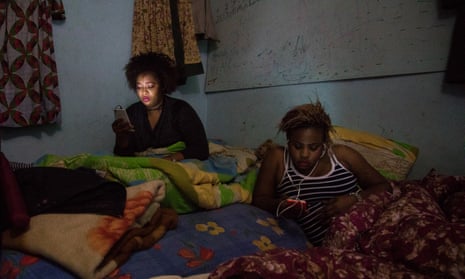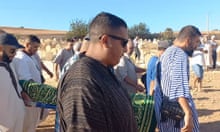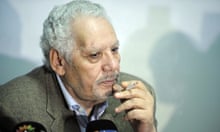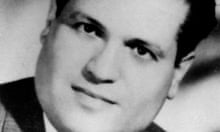Residents say the house feels like a prison. Situated on the outskirts of Algiers, it has two floors, no roof, piles of bedding - and a teeming microcosm of at least 30 itinerant west Africans.
The inhabitants come and go - people from Cameroon, Guinea, Niger. They conduct their love affairs, conflicts, business, card games, and look for work wherever they can find it.
Their principal aim is to move further north, to Europe. But since neighbouring Libya cracked down on migrants using its beaches as a launchpad to Europe, passage through Algeria has become more complicated.
“Almost everyone we knew [there] is in Europe now,” Josiane, a Cameroonian woman, said, looking at a picture of friends who have made it to Italy.
In his flat on the western outskirts of Algiers, Luc, another Cameroonian, has been making space for another arrival. His girlfriend’s cousin and 10-year-old son are expected that day. “She has family in France – they made the journey last year,” he said.
Sitting on the edge of a mattress holding his phone, a teenager is watching videos of demonstrations in Cameroon’s Anglophone region. “I came to take a boat,” he said. “It’ll be better for me there [in Europe]; school is better.”
His father, who made it to Europe a year ago after several years in Algeria, paid for the boy’s journey from Douala, Cameroon’s largest city. He arrived on his own about six months ago and was supposed to take the Libyan route, but fighting in Sabratha has meant departures have been suspended.
Luc sums up the situation: “The older ones have gone. And young ones have arrived. Since they can’t leave, they wait here.”
The Algerian authorities have been mounting a crackdown of their own, according to human rights groups, rounding up hundreds of migrants and deporting them. Human Rights Watch said on Monday that more than 3,000 had been expelled in the past two months, including pregnant women, newborn babies and unaccompanied children.
There are around 100,000 African migrants in Algeria, according to unofficial estimates, most from Mali, Niger and Burkina Faso.
At another location on the southern edge of the Algerian capital, mattresses are strewn along the pavements of a series of half-built apartment blocks. A group of young people from Conakry, the capital of Guinea, are dying their hair.
“I got here three months ago,” said one. Every morning, dozens of boys like him wait by the side of the road for someone to offer them a day’s work. “I didn’t know it would be difficult to find work in Algeria,” said Mohamed, who gives his age as 17.
Quick GuideHow has Europe dealt with its migration crisis?
Show
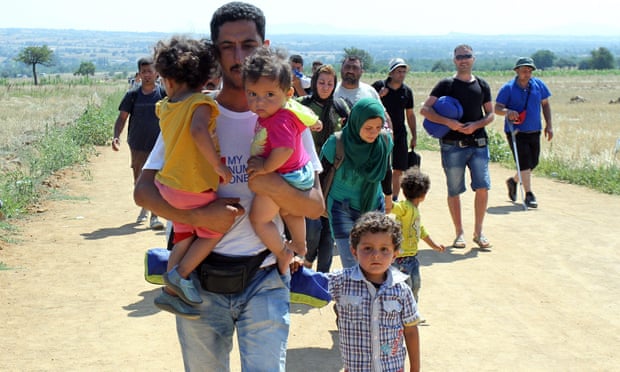
How did the crisis arise?
War, economic rout, insecurity and climate change on Europe's southern and eastern rim have combined to send millions of people fleeing – some escaping conflict, others seeking better prospects. More than 1 million arrived in Europe in 2015 alone.
How did the EU respond?
The migration crisis was one of the EU's biggest ever tests. While Germany initially adopted an open-door policy, leaders have striven to come up with solutions to staunch the flow, mindful of the dramatic impact of mass immigration on domestic politics.
What did they do?
The EU reached deals with Turkey and some north African countries to return migrants home, in return for development aid and other EU-funded programmes. Italy has also worked hard with Libyan authorities to block the flow of migrants through the north African country.
What is the upshot?
The number of migrants crossing the Mediterranean and entering south-eastern Europe has fallen sharply this year. But the EU has been criticised for in effect "bribing" poor countries to do its border management, and for creating an ugly bottleneck in north Africa in which abuse of destitute people has been rife.
Without any kind of community network – without even a few words of Arabic – these new migrants are in a precarious position. Mohamed and his friends sleep in the street. “Are there any voluntary organisations that could help?” one asked. Another wondered: “Do you know how I could get home? I’m tired.”
Kader, an Ivorian who has been in Algeria for six years, said there was a growing number of Guineans in Algiers. “They don’t know the country, and they react very badly the minute an Algerian is rude to them or insults them. It ends up in a fight, and people get hurt.”
The situation for women is equally precarious. In Oran, 250 miles (400km) west of Algiers, Adamo, from Cameroon, is attending a hospital appointment with a young pregnant woman.
“She arrived here from Tamanrasset a few days ago,” Adamo said. “She’s five months pregnant and hasn’t seen a doctor since the beginning of her pregnancy.” The young woman had been offered shelter by another migrant, sharing a small space with three others beneath a corrugated iron roof.
“It takes time for women to get to know the town, to learn how to move around,” said Adamo, with a sigh. “Those who have just got here are very vulnerable when they come up against those who have been here for longer; they try to scare them about what things are like in Algeria, so as to control them.”

In the town, the few volunteer organisations that work with migrant communities know they need to start from scratch with public awareness training. “We were working with 15 or so women,” said one volunteer activist, who asked to remain anonymous, “but they have all left.”
At the same time, organised groups of Nigerian migrants begging in Algeria’s major cities has roused public feeling. Students organised a solidarity meal during Ramadan and a popular singer, Sadek Bouzinou, recently released a video calling for tolerance.
In July, Algeria announced plans to grant residency and employment rights to illegal African migrants amid a shortage of workers in farming and construction, following an online campaign that revealed a surge in racist sentiment across the country. But these limited initiatives have little impact on the daily lives of the migrant communities. And for the past few weeks, the wave of arrests and expulsions of sub-Saharan migrants from the Algerian capital has strained the atmosphere further.
“I know one migrant who was arrested in the bus, on his way to work in the morning,” said Amara, a Liberian living in Algeria for two years. “My neighbour was arrested as she was leaving hospital with her newborn baby. I’m afraid of these arrests, I tell my wife not to go out.”
“I chose Algeria so as to be able to work,” Amara continued. “Here, my labour pays me more than I could make in my own country. So I grit my teeth, and I wait until this is over.”
- Zahra Chenaoui works for the French daily Le Monde. This article is part of a series by Politiken, Le Monde, El País, La Stampa, Der Spiegel and the Guardian.
- Editing changes were made post-publication to protect subjects
